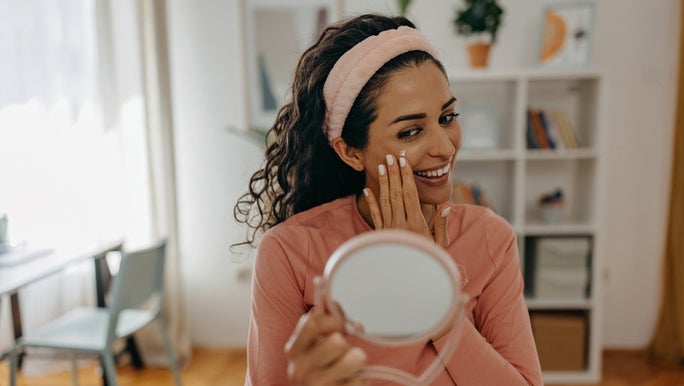Key Points
- Hyaluronic acid is a naturally occurring humectant.
- Hyaluronic acid production decreases as we age.
- Applying it topically may hydrate and rejuvenate your skin.
You may have heard people speak of the beauty benefits of hyaluronic acid in glowing terms. But for all its hype, does it offer genuine benefits for your skin?
In this article, we take a closer look at hyaluronic acid. What it is, what it does to your skin, and how to incorporate it into your beauty routine. With help from healthylife naturopath Gabbie Watt, we’ll get you up to speed on this skincare staple.
What is hyaluronic acid?
Hyaluronic acid is a humectant, which means it retains moisture in the skin. With its binding properties, it can hold over one thousand times its weight in water — effectively holding water molecules within your skin.
This naturally occurring molecule is found in all tissues of the body. “As we age, the body’s production of hyaluronic acid decreases, and the skin is less able to retain water, impacting skin hydration,” Gabbie says.
With this loss of volume and plumpness, some people may look to skincare products for a solution. And those containing hyaluronic acid have become some of the most popular.
However, unlike the natural hyaluronic acid in the body, the ingredient in your favourite skincare product is usually made in a lab. The process — known as biofermentation — creates hyaluronic acid that can be applied topically to the skin. And sometimes, it’s used as a filler in cosmetic injections to add plumpness to facial areas where volume may have decreased.
Is hyaluronic acid an active ingredient?
Skincare brands sometimes market ingredients— including probiotics and retinol — as ‘active’. However, it’s important to note that this term doesn’t have an exact definition.
“Active ingredients are largely considered ingredients whose activity on the skin has been scientifically demonstrated through in vitro and clinical studies,” Gabbie explains.
As scientific studies have shown hyaluronic acid to have an effect at a cellular level, it may be considered an active ingredient. However, it’s worth exploring the benefits and suitability before adding it to your skincare routine.

Improve skin health, hydration and rejuvenation may be some of the benefits of using skincare products containing hyaluronic acid
Potential benefits of hyaluronic acid on skin
A glance at today’s skincare market reveals numerous hyaluronic acid-containing products.
But beyond the hype, what are the benefits? And what value — if any — can it add to your skincare routine? Let’s explore the science behind this popular ingredient.
Want a natural approach to healthier skin? “Belonging to the extracellular matrix molecules in the dermis, hyaluronic acid is a key component of skin health and hydration,” Gabbie explains. Further, it may assist with wound and skin healing and tissue regeneration, as well as help reduce inflammation.
As a natural humectant, skincare products with hyaluronic acid as a key ingredient have been shown to boost moisture and improve skin hydration. “Hyaluronic acid occurs naturally in the human body and is a key molecule in skin moisture,” Gabbie explains.
Studies also indicate that skincare products featuring hyaluronic acid may be effective for rejuvenating the skin. Importantly, they are non-invasive when applied topically, offering a gentler alternative to some cosmetic procedures.
What does hyaluronic acid do to your skin?
As a substance that can attract and bind water to your skin, products containing hyaluronic acid may result in a more hydrated and healthier complexion.
Although the benefits sound promising, studies have found that the molecular size of the hyaluronic acid impacts permeability.
“The molecular size of hyaluronic acid is too large to penetrate the skin, so it often ends up remaining on the outer surface, only giving temporary results,” Gabbie says.
Products featuring smaller molecules, such as sodium hyaluronate, may penetrate further to the epidermis or top layer of skin.

Some skincare professionals recommend applying an oil-based moisturiser over the top of products containing hyaluronic acid
Can you overuse hyaluronic acid?
As much as your skin might love it, it is possible to overuse hyaluronic acid. So, as with any skincare product, it’s important to follow usage and frequency recommendations.
“Due to its water retaining properties, hyaluronic acid can act as a magnet for moisture,” Gabbie says. “While it can be beneficial in drawing in ambient moisture, there is a theory among skincare professionals that it may also have the potential to draw out the moisture from the deeper layers of the skin, leaving the skin dry.”
To avoid the potential of skin drying out and water loss through the dermal layers, skin experts may recommend applying an oil-based moisturiser over the top of products containing hyaluronic acid.
However, hyaluronic acid generally has a good reputation and is considered safe. Just remember though that you may enjoy more of the benefits if you apply it with the right products and ingredients to suit your skin type and skincare routine.
Hyaluronic acid skin care products
Want to explore the potential benefits of hyaluronic acid on your skin?
There are many products containing this popular ingredient, including:
- hyaluronic acid moisturisers
- hyaluronic acid creams
- hyaluronic acid supplements
- hyaluronic acid and vitamin C formulas
- vitamin C and hyaluronic acid serums
Hyaluronic acid and niacinamide
Niacinamide — another popular skincare ingredient — has been proven to penetrate deep into the skin and offer benefits, including improvements in hydration and hyperpigmentation. These water-based active ingredients are commonly combined and marketed as a more effective skincare duo.

Hyaluronic acid may be a worthwhile addition to your beauty routine if you seek hydrated skin
Hydrated, happy skin
When it comes to our skin, hydration is the name of the game. And the simple addition of hyaluronic acid to your skincare routine may help you achieve the moisture boost you need to start winning the game. Consult your healthcare professional if you have concerns about your skin.
Related:
Gabbie Watt is a Naturopath and is passionate about blending evidence-based practice and traditional natural medicine into her approach. With experience previously working as a Radiation Therapist, Gabbie’s professional background in conventional medicine has been instrumental in shaping her holistic approach to health.
Reviewed by healthylife health experts July 2023.



